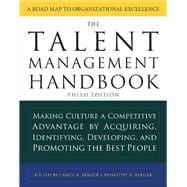Preface
Acknowledgments and Dedication
Introduction
Contributors
Part I: Using Talent Management to Build a High-Performance Workplace
1. Using Talent Management to Build a High-Performance Workplace
2. From Blueprint to Action: Signals and Guidance for Successful Talent Management Programs
3. Creating an Employer Brand that Attracts, Grows, and Retains the Right People
Part II: Talent Management Building Blocks
Building Block 1: Competency Assessment
4. Formulating Competencies
5. Driving Enterprise and Innovation Through Competency Development
6. Competencies for the Future Workforce
Building Block 2: Performance Appraisals
7. Understanding how to Use Performance Management for Organization Success
8. Using Performance Appraisals to Drive Organization Success
9. Big Five Performance Management A Quantum Leap in Employee Performance Appraisal
10. Analytics-Based Enterprise and Corporate Performance Management (EPM/CPM)
Building Block 3: Potential Forecasting
11. Forecasting Employee Potential for Growth
12. Measuring Up for the Skills Revolution: Talent Assessment in the Human Age
Part III: Talent Management Programs
Program 1: Talent Positioning: Succession and Career Planning and Outplacement
13. Integrating Succession Planning and Career Planning
14. Succession Planning Challenges and Solutions
15. CEO Succession Planning: A Process for Leading an Effective Management Transition
16. Building a Development Culture: Everyone Is a Stakeholder
17. How Workforce Trends Affect Outplacement Programs
Program 2: Talent Enhancement: Coaching, Training, Education, and Development
18. How Line Managers Can Foster Organization Performance Through Talent Enhancement
19. Developing Leadership Potential Through 360-Degree Feedback and Coaching
20. Developing Your Workforce: Measurement Makes a Difference
21. Enriching Executive Development: The Essential Partnership Between Human Resources Professionals and Executive Coaches
22. Change and Compassion: The Essence of Effective Coaching
23. The Role of the Manager in Talent Management
Program 3: Talent Mobility: Acquisition, Onboarding, and Outplacement
24. Novel Ways to Win the Battle for Great Talent
25. Leading Practices in Building a More Successful Approach to Talent Acquisition
26. Social Recruiting: Pick Up The Pace or Be Left Behind
27. Increasing Your Odds of Success in Picking the Right CEO
28. Onboarding as a Critical Component of a Talent Acquisition Strategy
29. Using Storytelling to Make Onboarding More Inspiring and Effective
Program 4: Compensation
30. Using the Right Rewards Program to Help Your Talent Management Program Fuel Transformation
31. Using a Total Rewards Strategy to Support Your Talent Management Program
32. Aligning Total Compensation Programs with Organization Values, Strategy, and Talent Management Processes
33. Using Compensation to Win the Talent Wars
34. Developing an Effective Compensation Philosophy that Attracts, Motivates, Retains, and Develops Top Talent
Part IV: Culture
35. Driving Competitive Advantage Through Nontraditional Approaches to Engagement Surveys
36. Using Diagnostic Assessment for Creative and Innovative Talent Management
37. Characteristics of Innovative Individuals and Organizations
38. Creating and Maintaining a Culture of Innovation, Engagement, Leadership, and Performance
39. Reframing Creativity as a Martial Art
40. Reimagining the Twenty-First Century Employment Relationship: Aligning Human Resource and Corporate Social Responsibility Through Employment Policies and Practices
41. Making Ethics an Integral Component of Your Talent Management System
42. Building a Reservoir of Women Super Keepers
Part V: Global Talent Management
43. Acquiring and Retaining Expatriate Talent
44. Developing Global Leadership Competencies
Part VI: Big Data
45. Talent Development Reporting Principles (TDRp): Standards for the Measurement, Reporting, and Management of Human Capital
46. The Internal Labor Market Paradigm: A Model for Using Analytics to Evaluate and Interpret Workforce and Business Performance Data
47. The Role of HT Technology in Talent Management
48. Effective Talent Management Systems
49. Realizing the Value of Big Data for Talent Management
Part VII: Talent Management Competencies for Leaders and Professionals
50. A Competency-Driven Approach to Talent Management Optimization
51. Developing the Talent Developers
52. Evolving Organization Development for the Future
Part VIII: Significant Trends Affecting Talent Management Practices
53. Balancing Talent and Organization Culture: A Winning Combination
54. HR Levers that Drive Business Results
55. Eight Trends Shaping the Future of Talent Management Programs
Index









